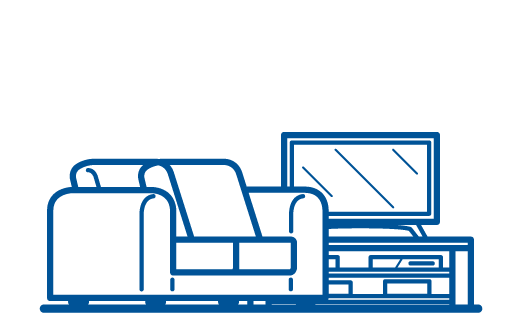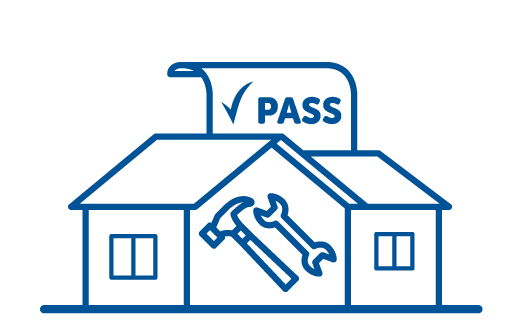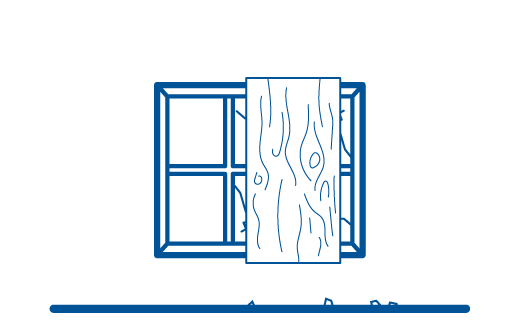Does Condo-Unit Insurance Cover Earthquakes?
Your Homeowners Policy Doesn’t Cover Earthquake Damage
In most cases, damage to your condo-unit from an earthquake is not covered by a condo-unit insurance policy. In California, a separate policy is needed to protect your condo-unit investment and recover from the effects of a major earthquake. Prepare today with CEA earthquake condo-unit insurance.

Building Property
If your homeowners association (HOA) has earthquake insurance, it covers only the outside of the condominium buildings and the common areas. Individual condo-unit owners earthquake policies cover the contents inside the walls of the condo unit, not the structure itself. Building Property coverage helps you repair interior walls, flooring, fixtures, and windows when the inside of your condo unit is damaged by an earthquake.
If your homeowners association (HOA) has earthquake insurance, it covers only the outside of the condominium buildings and the common areas. Individual condo-unit owners earthquake policies cover the contents inside the walls of the condo unit, not the structure itself. Building Property coverage helps you repair interior walls, flooring, fixtures, and windows when the inside of your condo unit is damaged by an earthquake.

Personal Property
Personal property coverage protects your belongings inside your condo unit. This includes furniture, appliances, clothing, sporting goods, and electronics that are damaged or destroyed in the event of an earthquake.
Personal property coverage protects your belongings inside your condo unit. This includes furniture, appliances, clothing, sporting goods, and electronics that are damaged or destroyed in the event of an earthquake.

Loss of Use
When there is quake damage to your condominium building or condo unit, a civil authority may restrict access to your building or condo unit. Loss of Use covers the cost for additional living expenses if you must live outside your home. Keep in mind you may be still paying your mortgage while in temporary rental housing. Loss of Use not only covers temporary rent but also food, moving, and storage expenses. Loss of Use coverage never has a deductible or time limit.
When there is quake damage to your condominium building or condo unit, a civil authority may restrict access to your building or condo unit. Loss of Use covers the cost for additional living expenses if you must live outside your home. Keep in mind you may be still paying your mortgage while in temporary rental housing. Loss of Use not only covers temporary rent but also food, moving, and storage expenses. Loss of Use coverage never has a deductible or time limit.

Loss Assessment
Loss Assessment coverage helps pay your share of certain additional assessments levied by your HOA on its members for earthquake-damage repairs or to pay a master-earthquake policy deductible. This coverage can help with charges for repairs to the exterior of your condo development or certain common areas, as well as building code upgrades.
Loss Assessment coverage helps pay your share of certain additional assessments levied by your HOA on its members for earthquake-damage repairs or to pay a master-earthquake policy deductible. This coverage can help with charges for repairs to the exterior of your condo development or certain common areas, as well as building code upgrades.

Building Code Upgrades
Older condo units that are damaged by an earthquake may need upgraded components such as plumbing, electrical, heating and air conditioning systems to pass local and state building inspections. Rebuilding after a devastating earthquake generally must be done to current building-code standards
Older condo units that are damaged by an earthquake may need upgraded components such as plumbing, electrical, heating and air conditioning systems to pass local and state building inspections. Rebuilding after a devastating earthquake generally must be done to current building-code standards

Emergency Repairs
Emergency and necessary repairs may be needed after an earthquake to help protect your condo unit and your family’s safety following earthquakes or aftershocks, or to prevent rain damage that may occur after a major earthquake. This could include labor and materials needed to board up damaged windows or remove broken glass from furniture.
Emergency and necessary repairs may be needed after an earthquake to help protect your condo unit and your family’s safety following earthquakes or aftershocks, or to prevent rain damage that may occur after a major earthquake. This could include labor and materials needed to board up damaged windows or remove broken glass from furniture.
Learn More About CEA Condo-unit Coverage
- Get more details about our condo-unit policy coverages and deductibles.
Read Your CEA Policy Carefully
*We encourage you to read your entire CEA policy—and its policy declarations page—and talk to your agent to understand your coverages and how they work. Exclusions and special limits apply. All terms and conditions of CEA insurance coverage are found in the CEA insurance-policy form. Refer to a sample policy, below.
